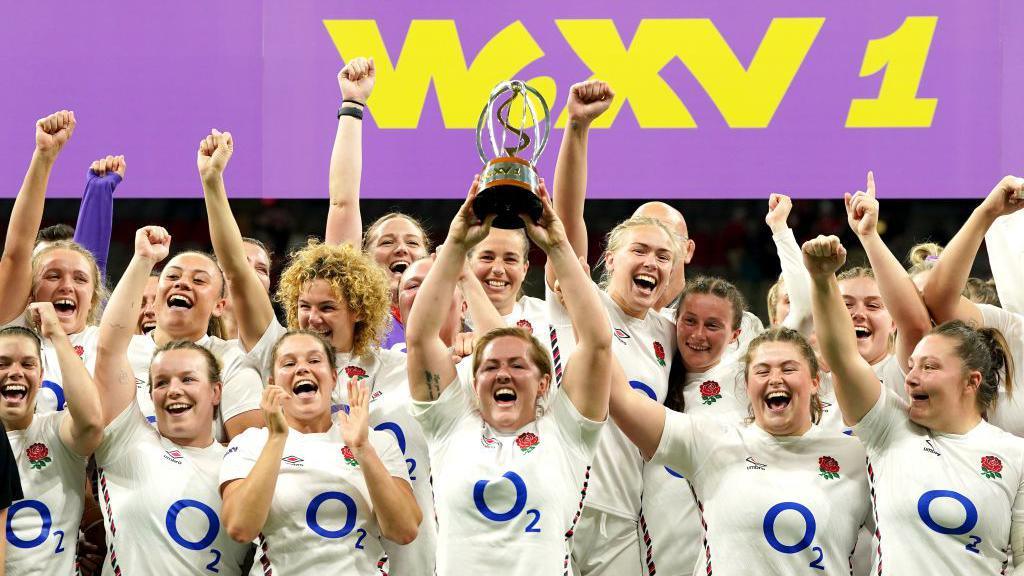- 3 Comments
As part of World Rugby’s changes to the women’s global calendar, England, Scotland, Ireland, and Wales now have complete control over their autumn matches.
The top 12 teams in the world will compete against each other in the new WXV Global Series, which will replace the WXV competition, starting in 2026-2028.
National federations and unions will be able to select their own home and away games in September and October, hoping to capitalize on the success of the Women’s Rugby World Cup in England.
Australia, Canada, France, Italy, Japan, New Zealand, South Africa, and the United States are among the top 12 nations along with each of their home countries.
The WXV Global Series will remain a part of the World Rugby World Cup until 2029, with those 12 nations remaining.
No matter how many Tests they choose to play, each team will receive the same amount of money from World Rugby to compete in the matches.
Following the World Cup, each nation will make announcements regarding fixtures.
World Rugby’s executive, Alan Gilpin, said, “We need to give the national federations, players, and fans certainty about [breakaway league] R360 and other competitions that are being discussed.
“Over a four-year cycle, this provides that certainty that allows the national federations and unions to engage in those discussions about contracts with the player groups. It represents a significant milestone.
World Rugby’s 13-18 teams will play their matches in a single location in 2026 and 2028, which will be funded by the world’s ruling body.
Brazil, Fiji, Hong Kong, China, the Netherlands, Samoa, and Spain are among those teams.
This means that WXV, a three-tier competition that was introduced in 2023 to provide more meaningful games before the World Cup, will no longer be a part of.
The top 12 teams, according to BBC Sport, will play between 9 and 16 Tests in a calendar year, with a maximum of six Tests, outside of World Cup years.
When home nations play games against each other in 2027, which also includes the first British and Irish Lions women’s tour to New Zealand, the total games will be played.
The three-year Global Series competition, which is expected to draw on the success of the World Cup in England, which has had record-breaking viewing numbers and the final at Twickenham on September 27th, will have sold out, according to World Rugby, with a $ 9 million investment.
World Rugby Chairman Brett Robinson continued, “The launch of the WXV Global Series is another landmark moment for the women’s game, following what will be an era-defining Women’s Rugby World Cup in England.”
It fulfills our commitment to higher standards, provide consistent and competitive fixtures, establish a balanced international calendar that places welfare first, and produce long-term commercial benefits for the women’s game worldwide.
Analysis of “Space for Women’s Rugby to Create its Own Narratives”
Unions that have invested in their women’s teams should have more control over their fan bases and more fixtures.
Losing the WXV titles may stifle narratives, but it also opens up opportunities for women’s rugby to develop their own, such as the Hillary Shield (winner of England vs. New Zealand) or the Ella-Mobbs Cup (winner of England vs. Australia).
Local organizers reported that just under 4, 000 people showed up for the opening triple-header day, which included hosts Canada and England beating the United States and Ireland beating world champions New Zealand.
Wales and Australia faced off against Australia at WXV2 in South Africa, which attracted just 291 spectators.
As the women’s game strives to be both sustainable and profitable, the unions will regain control of the rights to TV and sponsorship.
Nationwide, which are less committed to growth, poses a challenge. From October, Scotland will have 15 players on a contract, with the lowest-cost option being chosen.
Even though Australia hosts the 2029 World Cup, many players struggle with work that might prevent them from traveling home unless more full-time opportunities arise.
JavaScript must be enabled in your browser to play this video.
related subjects
- Rugby Union
Source: BBC

Leave a Reply